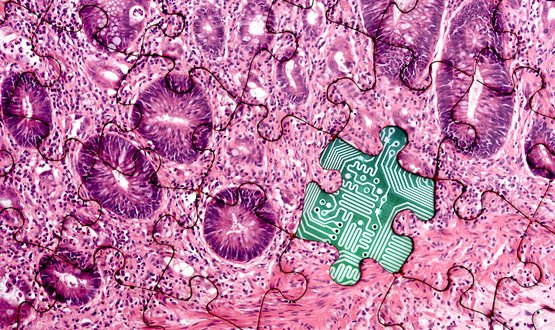North of England receives £10m boost for AI and digital pathology work
- 6 November 2018

Researchers in Leeds have been awarded a £10.1m investment from UK Research and Innovation to expand a digital pathology and artificial intelligence (AI) programme across the North of England.
The programme aims to explore new ways of speeding up the diagnosis of diseases – including cancer – through the application of AI.
It will also address whether regional clinical pathology services can be better integrated to support improved patient outcomes.
The investment was secured following a bid led by Leeds Teaching Hospitals NHS Trust and the University of Leeds.
The organisations form part of a wider consortium called the Northern Pathology Imaging Co-operative (NPIC), established to foster collaboration in diagnostics across clinicians, academia and health technology companies.
Sir Alan Langlands, vice-chancellor of the University of Leeds, said: “Leeds Teaching Hospitals NHS Trust is a global leader in the area of digital pathology for cancer diagnosis, thanks to the close links with academic researchers.
“We are now expanding this digitisation across the north through this exciting partnership between universities, the NHS and industry. Going forward, new technologies such as artificial intelligence have the potential to transform how we diagnose cancer and other diseases, and the University is making great advances in this area.”
NPIC comprises nine NHS hospitals, seven universities, nine medical technology companies and Swiss company Roche Diagnostics.
The investment was announced on 6 November by Greg Clark, Secretary of State for Business, Energy and Industrial Strategy (BEIS), as part of the Industrial Strategy Challenge Fund.
Dr Yvette Oade, chief medical officer at Leeds Teaching Hospitals NHS Trust, said the investment presented “a huge opportunity for Yorkshire to lead in this new area and further enhance our position as a hub for medical technology”.
Dr Oade added: “This is a really exciting step for patients because computers using artificial intelligence can be trained to recognise the patterns of disease.
“Machines will support clinically trained pathologists to diagnose cancer faster, better and at lower cost.
“We can also explore how to use digital pathology as part of precision medicine to ensure patients receive treatments tailored to their disease.
Pushing the joined-up agenda
The project also aims to develop more integrated ways of working across regional clinical pathology services.
NPIC said it would involve the public regarding the use of anonymised images for AI research. It will also help inform the development of a national pathology exchange, which will allow pathology images to be shared between NHS sites nationally similar to efforts underway in NHS Scotland.
Geoff Twist, managing director for Roche Diagnostics, said: “We are delighted to be a partner in this pioneering project that will introduce digital pathology and AI to a large network across the North of England covering a population of approximately 15 million people.
“This is a true collaboration with partners from across healthcare delivery and industry, coming together with a common goal to improve diagnostic capabilities to offer cancer patients the best care possible. The ultimate aim is to develop an exemplar model that can be replicated across the UK for the benefit of cancer patients.”
Health Secretary and health IT fanatic, Matt Hancock, added: “Artificial intelligence will play a crucial role in the future of the NHS – and we need to embrace it by introducing systems which can speed up diagnoses, improve patient outcomes, make every pound go further and give clinicians more time with their patients.
“As part of our long-term plan, we will transform the NHS into an ecosystem of enterprise and innovation that allows technology to flourish and evolve.”



